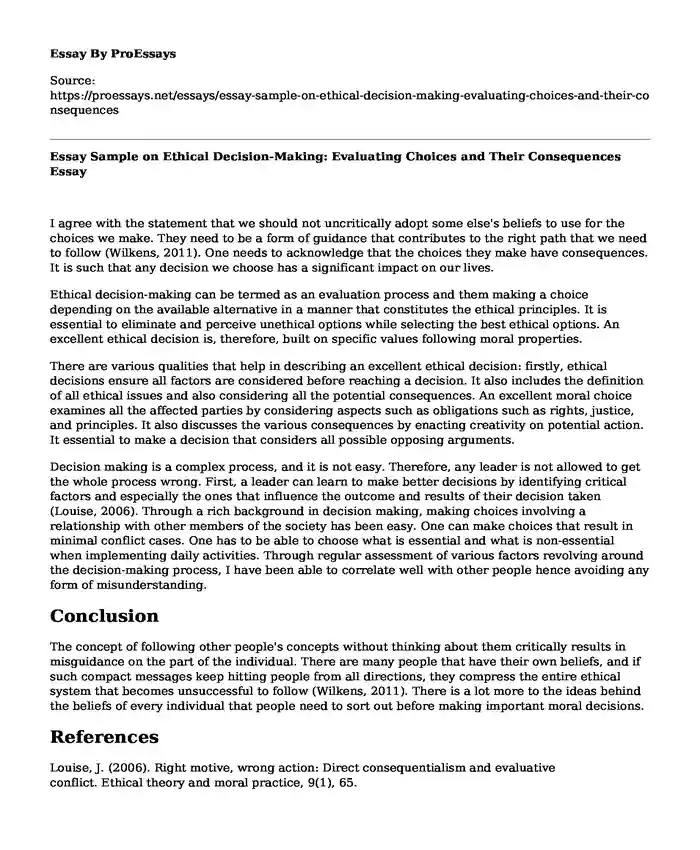I agree with the statement that we should not uncritically adopt some else's beliefs to use for the choices we make. They need to be a form of guidance that contributes to the right path that we need to follow (Wilkens, 2011). One needs to acknowledge that the choices they make have consequences. It is such that any decision we choose has a significant impact on our lives.
Ethical decision-making can be termed as an evaluation process and them making a choice depending on the available alternative in a manner that constitutes the ethical principles. It is essential to eliminate and perceive unethical options while selecting the best ethical options. An excellent ethical decision is, therefore, built on specific values following moral properties.
There are various qualities that help in describing an excellent ethical decision: firstly, ethical decisions ensure all factors are considered before reaching a decision. It also includes the definition of all ethical issues and also considering all the potential consequences. An excellent moral choice examines all the affected parties by considering aspects such as obligations such as rights, justice, and principles. It also discusses the various consequences by enacting creativity on potential action. It essential to make a decision that considers all possible opposing arguments.
Decision making is a complex process, and it is not easy. Therefore, any leader is not allowed to get the whole process wrong. First, a leader can learn to make better decisions by identifying critical factors and especially the ones that influence the outcome and results of their decision taken (Louise, 2006). Through a rich background in decision making, making choices involving a relationship with other members of the society has been easy. One can make choices that result in minimal conflict cases. One has to be able to choose what is essential and what is non-essential when implementing daily activities. Through regular assessment of various factors revolving around the decision-making process, I have been able to correlate well with other people hence avoiding any form of misunderstanding.
Conclusion
The concept of following other people's concepts without thinking about them critically results in misguidance on the part of the individual. There are many people that have their own beliefs, and if such compact messages keep hitting people from all directions, they compress the entire ethical system that becomes unsuccessful to follow (Wilkens, 2011). There is a lot more to the ideas behind the beliefs of every individual that people need to sort out before making important moral decisions.
References
Louise, J. (2006). Right motive, wrong action: Direct consequentialism and evaluative conflict. Ethical theory and moral practice, 9(1), 65.
Wilkens, S. (2011). Beyond bumper sticker ethics: An introduction to theories of right and wrong. Intervarsity Press.
Cite this page
Essay Sample on Ethical Decision-Making: Evaluating Choices and Their Consequences. (2023, Sep 17). Retrieved from https://proessays.net/essays/essay-sample-on-ethical-decision-making-evaluating-choices-and-their-consequences
If you are the original author of this essay and no longer wish to have it published on the ProEssays website, please click below to request its removal:
- Questions and Answers on Ethics, Charity, Animal Rights
- Psychology Paper Sample: How Parental Verbal Abuse Affects Child Personality and Social Behavior
- Potential Ethical Considerations on International Thermonuclear Experimental Reactor (ITER) Project
- The Ronald McDonald Charity House - Paper Example
- Paper Example on Chaining to Teach a Functional Self-Help Skill to a Child With Autism
- Essay Sample on Leadership in History
- Attachment Patterns: Understanding Our Vulnerabilities & Strengths - Essay Sample







